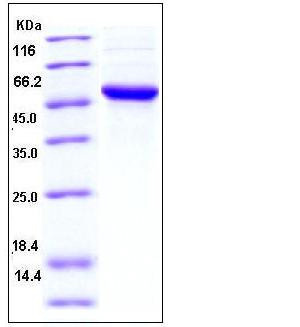Human Interferon omega-1 / IFNω / IFNW1 Protein (Fc Tag)
IFN-omega 1,IFNW1,interferon omega-1
- 100ug (NPP1816) Please inquiry
| Catalog Number | P10353-H01H |
|---|---|
| Organism Species | Human |
| Host | Human Cells |
| Synonyms | IFN-omega 1,IFNW1,interferon omega-1 |
| Molecular Weight | The recombinant human IFNω/Fc chimera is a disulfide-linked homodimer. The reduced monomer comprises 409 amino acids with a predicted molecular mass of 46.6 kDa. As a result of glycosylation, rh IFNω/Fc monomer migrates as an approximately 50 kDa band in SDS-PAGE under reducing conditions. |
| predicted N | Glu 20 |
| SDS-PAGE |  |
| Purity | > 92 % as determined by SDS-PAGE |
| Protein Construction | A DNA sequence encoding the human IFNω (NP_002168.1) (Cys 24-Ser 195) was fused with the Fc region of human IgG1 at the N-terminus. |
| Bio-activity | Measured in antiviral assays using WISH human amnion cells infected with vesicular stomatitis virus (VSV). The EC50 for this effect is 0.03-0.3 ng/mL. |
| Research Area | Epigenetics |Cell cycle |Cell Differentiation |
| Formulation | Lyophilized from sterile PBS, pH 7.4 1. Normally 5 % - 8 % trehalose, mannitol and 0.01% Tween80 are added as protectants before lyophilization. Specific concentrations are included in the hardcopy of COA. |
| Background | IFNs are a large family of proteins having antiviral, antiproliferative, and immunomodulatory effects, and are divided into two major classes, type I and type I I, on the basis of differences in receptor binding and nucleotide sequence. Type I IFNs consist of IFN α, β, τ, and ω and bind to the type I IFN receptor, whereas IFN-γ is the only type I I IFN and is specific for the type I I IFN receptor. Human IFN-ω, was identified by three independent groups in 1985 and is structurally related to IFN-α and -β. Both human IFN-ω and IFN-α are produced by virally induced leukocytes and have similar antiviral activities on human cell lines, and a sizeable proportion (at least 10%) of the total antiviral activity of leukocyte IFN is contributed by IFN-ωl. In addition, it was reported that IFN-ω could inhibit the growth of human tumors in vivo. |
| Reference |
